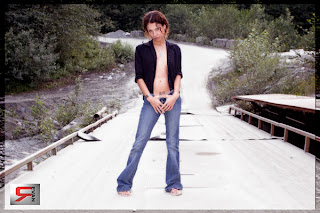I had been at work in the office for half an hour when I heard the chatter over the scanner.
The 108 Volunteer Fire Department was paged to respond to a fire at the 108 Resort.
I wondered if it was big enough for 100 Mile Fire-Rescue, something I'm a member of, to be called out to as well.
That's when my pager went off.
"100 Mile Fire Department: Group page," said the familiar man's voice.
I jumped up.
Should I go? Could I go, just leave work and battle a blaze that may take two minutes to 20 hours?
I consulted my co-workers and, when we heard the urgency in the voices over the radio, I left to the fire hall.
I made it in time to jump on Engine 11.
Then the big, yellow vehicle drove from the hall, sirens wailing and horns honking through every intersection.
Upon arrival on scene, I saw various trucks already there, gathering around the front of the hotel. Flames leaped 15 feet into the hazy sky.
Nervous excitement invaded the engine's cab of five firefighters and we were driven around to the back, where we could see the full extent of the damage.
Although the front of the building looked intact, the back, by that time, was not faring as well and the interiors of the rooms were fully exposed and engulfed.
Our driver painstakingly backed the hulking vehicle down a golf cart lane and parked; we jumped out, in full gear, and started readying hundreds of metres of hoses.
No hydrants were close by; hoses shot off in all directions and I joined two men trying to pry open a small shed where a closer hydrant hid.
As one member pulled the door, I wedged a shovel between the gap and jarred the door just enough so I could fit in.
The hydrant within was old, rusted and impossible for me to work by myself.
Possibly thinking me a wuss, another member squeezed in and tried, only breaking his tools on the stuck valves.
I didn't feel so bad then.
When we did get it open I went back to the incident commander for reassignment. I was placed on a two-and-a-half inch hose, where I sat, spraying the building, for at least two hours.
After being order to rehab, I trudged through the snow to the front of the building where an ambulance waited for firefighters, to take their blood pressure and heart rate. This was no easy task, as my equipment weighs more than I do and, combined with the knee-deep snow, likely made watching me get around the scene very comical.
In the ambulance for 10 minutes, I went back to my post to take charge of a slightly smaller hose; this allowed me to be more mobile and spray vaster areas, with ease.
Although the temperature was a balmy -2 C, my soaked hands still froze in my gloves, prompting a trip to rehab again a few hours later.
Time flew by as crews steadily worked to get the fire under control and, around 3:30 p.m., officials were confident we had stopped the blaze at a breezeway between the sections of rooms. About one-third of the building was lost; but, on the bright side, that meant two-thirds of the building was saved.
It was time to clean up — no easy task.
Hose had to be collected, rolled and loaded; ladders needed to be collapsed and carried; and hot spots still needed to be tended to, something the 108 department stayed behind to look after.
Back at the hall, trucks, hoses, gear and tools needed to be organized and cleaned, something that took hours.
When it was all done, most of the crew took a few minutes to discuss the day; the chief seemed please with our performances and now the investigation into the cause of the blaze would begin.
I enjoyed the day but, I have to admit, I was a bit sore the next day; but I’ll do it all again should need be — I’d never wish for a fire but I hope to be there, ready, when it happens.
The experience gave me even greater respect for those who do the job day in and out — they must have really strong hands because I couldn’t even turn my bedroom door handle the next morning.
http://www.bcdailybuzz.com/profile_blogs/LauraK/&action=view&id=29
Subscribe to:
Post Comments (Atom)


No comments:
Post a Comment